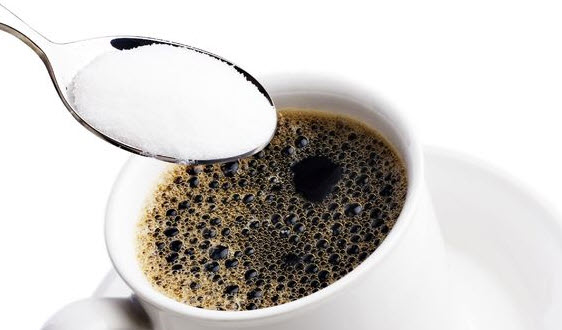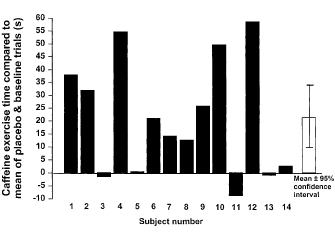
How to combine creatine and caffeine effectively
Due to a study published by some researchers from my home country (Belgium) it was long commonly accepted in the bodybuilding world that creatine and caffeine should not be combined because caffeine negates the positive effects creatine supplementation has. However, a more recent study (Caffeine is ergogenic after supplementation of oral creatine monohydrate) has shown that there might be a way to effectively combine the beneficial effects of both creatine and caffeine as long as caffeine isn’t administered regularly. In this study, fourteen trained male subjects were supplemented with 5 mg of creatine for six days. As you can clearly see in this graph, in most subjects caffeine provided an additional boost in terms of total running time in most subjects:

Physical exercise reduces the amount of ATP (the molecule your cells use as fuel) in muscle cells. As a result the enzyme AMPK becomes more active in muscle cells, which triggers them to start burning fat and become more sensitive to insulin. It shouldn’t surprise you that researchers everywhere are working on pills that activate AMPK, as this could mimic the effects of doing sports without even having to get out of bed. A Japanese study (Caffeine acutely activates 5’adenosine monophosphate-activated protein kinase and increases insulin-independent glucose transport in rat skeletal muscles) discovered that caffeine raises AMPK but at the same time decreases the creatine content in muscle cells. Although the concentrations the researchers used are much higher than the those found in the human body, it seems to indicate that caffeine disrupts the muscle cell’s creatine metabolism.
In conclusion; if you are supplementing creatine, regular high doses of caffeine will cancel out its effect. However, you might be able to benefit from the performance boost provided by both creatine and caffeine provided you limit your intake of the latter to about once a week.
Disclaimer: there is limited research on this subject so although this is the best answer currently available, take it with a grain of salt.
This post is also available in: Spanish
